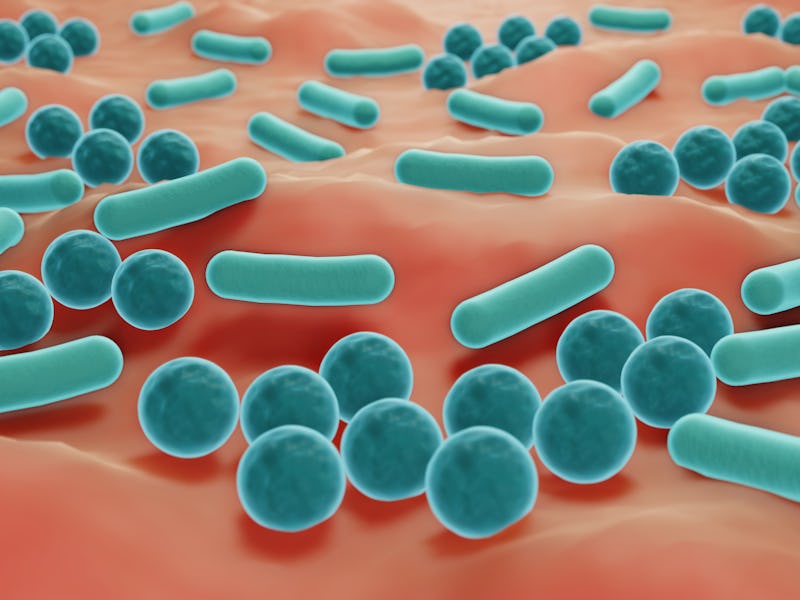Western diets may have a pernicious side-effect on the gut microbiome — study
Put down the French fries, perhaps.

Maybe your pants are tighter than usual or you’ve exhausted yourself walking up the stairs, but it’s never too late to get in shape. Unfortunately, all of the advice on the internet promising quick and easy results in less than 30 days is overwhelming at best, unhelpful and misleading at worst. If you’re unsure of where to start, try to listen to your gut.
Inverse is counting down the ten most-surprising discoveries about your wondrous gut in 2021. This is #6. Read the original story here.
It turns out your gut bacteria have a lot to say about what’s you’re putting in your body. For example, when you feed your gut with the food that benefits the bacteria already living there, you’re rewarded with a diverse gut microbiome that helps prevent obesity and other health conditions. But do the opposite and you could spur chronic inflammation — irritating your gut and ultimately making it harder to get in shape. Unfortunately, this may be particularly difficult for some populations to achieve.
The discovery — In a study published in April, scientists found that certain foods in the Western diet are more likely to promote harmful gut bacterial species and in turn spur inflammation. However, people who ate more fish and a plant-based diet appear to be both healthier overall and less likely to experience inflammation.
While it was already known that Western diets were bad for you, the current study established clear connections between diet and the growth of specific bacterial species in the gut.
Eating large amounts of meat and processed food (think of mayonnaise or French fries) cultivated a pro-inflammatory bacterium called Firmicutes, a Ruminococcus species of the Blautia genus. Having large amounts of sugar and alcohol in your system were also associated with harmful bacteria that increase inflammation.
Digging into the details — Harmful gut bacteria stimulate an immune response because they erode the mucus membrane of the gut lining.
“These bacteria stay inside the intestines as long as the lining of the intestine, commonly referred to as the gut barrier, is intact,” Michael Bailey, an Ohio State University professor not involved in the study previously explained to Inverse for a related story.
“The immune system does not strongly respond to these microbes when they are inside the intestine, but if the barrier becomes leaky, then the bacteria, or pieces of the bacteria, can enter into the blood to stimulate an immune response,” he adds.
Conversely, people who eat more vegetables, plant-based foods, and fish show higher levels of “good” bacteria. These bacteria have anti-inflammatory effects and help the digestive system to absorb nutrients from food.
Coffee drinkers were more likely to have Oscillibacter — a bacterium that has anti-inflammatory properties. Low-fat, fermented dairy products were also linked to higher populations of lactic acid bacteria, and these in turn have many well-established health benefits.
Here's the background —Western diets are high in fat and sugar and are notorious for altering the gut microbiome. A dysregulated gut microbiome impairs the immune response, and may cause increased inflammation and a greater risk for inflammatory bowel disease (IBD).
People with IBD also tend to show altered gut microbiomes and populations of gut microbes that promote inflammation. However, eating anti-inflammatory foods can promote a balanced microbiome and suppress flare-ups of inflammation.
Why it matters — More than 1.9 billion adults are overweight, and 650 million people are obese, which is a form of inflammatory disease. Cultivating anti-inflammatory bacteria in your gut can in turn help to protect you against chronic inflammatory diseases, the study suggests.
Another separate study has also shown how people taking probiotics with Akkermansia muciniphila microbes have a ramped up metabolism and lose weight. Prebiotics and synbiotics also reduce inflammatory responses and restore metabolic processes, research suggests.
Together, the results suggest how following a Mediterranean diet or adding more anti-inflammatory foods such as nuts, fish, and whole grains into your diet may help reduce your risk of developing inflammatory diseases and improve your metabolism.